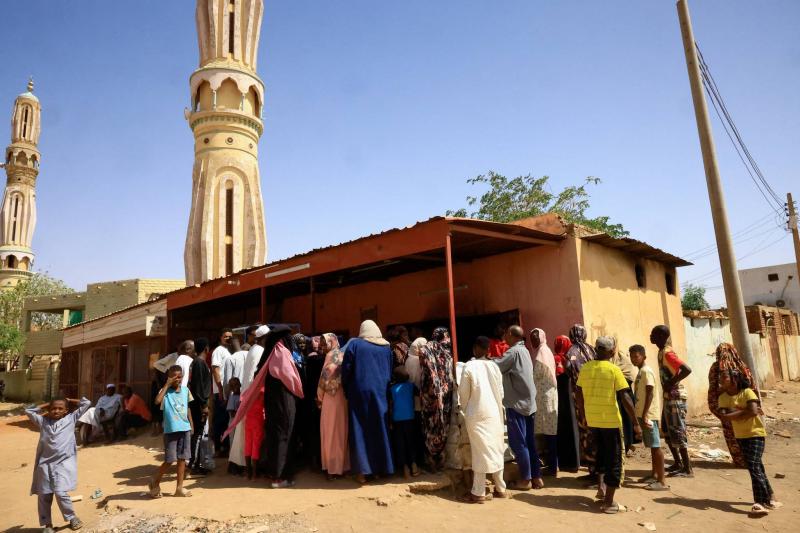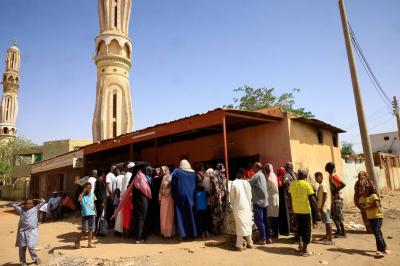After more than a week of fighting between the Sudanese army and Rapid Support Forces, and following international efforts to urge both sides to a three-day ceasefire, citizens and residents began to move towards safe areas last Friday to visit their families during the Eid al-Fitr holiday. However, the ceasefire was not respected, as sporadic gunfire was heard, particularly around the presidential palace, and fierce clashes erupted between the warring parties in the Al-Sahafa area south of Khartoum. While each side accuses the other of not adhering to the truce, various Arab, European, and foreign countries took advantage of the intermittent ceasefire to evacuate their nationals from Sudan and find safe passages, amid fears of a return to violent clashes after the holiday.
In a report, it was noted that "the Saudi foreign minister received a call from his British counterpart, discussing developments in Sudan." Sudanese sources also reported that "a large number of prisoners escaped from Kober prison north of Khartoum," with conflicting reports about the escape of deposed President Omar Bashir and leaders of the former regime. Media in Sudan reported the escape of ex-President Omar Bashir from Kober prison along with many inmates, showing a video of an attack on Kober prison and the escape of prisoners.
Journalists in Sudan reported that "the Sudanese president is currently receiving medical care in a hospital in the capital Khartoum." The same sources confirmed that the repeated attacks and clashes around Kober prison led to the release of many inmates, noting that "political prisoners are still in custody." Reports continued regarding Bashir's escape and the regime's leaders from Kober prison.
The attacks on the infamous prison, which houses prominent leaders from Bashir's rule, including Bashir himself, repeated on the day of the report. It is noteworthy that the "Al-Huda" prison also witnessed an inmate escape after being stormed. Other prisons have experienced similar incidents of attacks and inmate escapes during the ongoing clashes between the Rapid Support Forces and the army since last week, including the escape of several inmates from "Soba" prison south of the capital after being released by the Rapid Support Forces.
After the announced three-day ceasefire in Sudan between the army and Rapid Support Forces ended without announcement of an extension, the Egyptian foreign minister and the secretary-general of the Organization of Islamic Cooperation emphasized the need for adherence to the ceasefire in Sudan.
Pope Francis Calls for Dialogue and De-escalation
Pope Francis called on Sunday for "dialogue to address the serious situation in Sudan, as fighting between the Sudanese army and Rapid Support Forces entered its second week." The Pope stated during mass in St. Peter's Square: "Unfortunately, the situation remains dangerous in Sudan, and I renew my call for an immediate end to violence and the resumption of dialogue. I urge everyone to pray for our Sudanese brothers and sisters."
Evacuations for European and Foreign Countries
Many evacuation efforts are taking place via Port Sudan, located directly about 650 kilometers northeast of Khartoum, but around 800 kilometers by land. The U.S. military evacuated American embassy employees in Sudan on Sunday. President Joe Biden noted that "the U.S. military conducted the operation and extracted employees affiliated with the U.S. government," pointing out that "Washington has temporarily suspended operations at its embassy amidst ongoing fighting in Sudan."
Biden stated in a statement that he receives "regular reports from his team about their ongoing work to assist Americans in Sudan to the greatest extent possible and that he is working with allies and partners on this matter."
For his part, U.S. Secretary of State Antony Blinken confirmed that "the United States has temporarily suspended operations at its embassy in Khartoum and safely evacuated all American staff and their families amid ongoing violence in Sudan." Blinken added in a statement: "We will continue to assist Americans in Sudan, planning for their safety and keeping American citizens in the region updated on the latest developments there," reiterating calls for both sides of the conflict "to extend the holiday ceasefire and urgently expand it for a permanent halt to hostilities."
The Rapid Support Forces announced early on Sunday that "the U.S. military evacuated American diplomats and their families from Sudan while fighting continued between the warring sides, resulting in hundreds of civilian deaths." The Rapid Support Forces pointed out that "the evacuation was coordinated with them."
The French foreign ministry announced on Sunday that "the country is carrying out the evacuation of its diplomats and citizens from Sudan," stating that "100 people have been evacuated, with another 100 to follow." The British Prime Minister spoke about "completing a complex and speedy evacuation operation for British diplomats and their families from Sudan." Meanwhile, the Russian ambassador to Khartoum noted that "140 out of 300 Russian citizens in Sudan have expressed their desire to leave. Plans for evacuation have been made, but it remains impossible to execute them due to the need to cross combat zones. About 15 people, including a woman and a child, are stranded in an Orthodox church close to intense fighting in Khartoum."
The Dutch Foreign Minister, Wopke Hoekstra, indicated that "his country has joined the international efforts to evacuate nationals from Sudan," revealing that "the first group of Dutch nationals has been evacuated from Sudan." He explained that "a handful of Dutch citizens managed to leave Khartoum on a French plane as part of a very complex operation carried out with the help of France, Germany, and other countries. We hope that a larger group will be able to leave this evening, using two military aircraft sent by the Netherlands to Jordan last week to assist in evacuation efforts."
According to a spokesman for the German defense ministry, "the first German military aircraft landed in Khartoum before 4 PM (1400 GMT) today. The evacuation of German nationals and citizens of other countries will take some time." The Swedish parliament approved sending 400 soldiers to Sudan to evacuate Swedes.
Western countries are expected to send aircraft to evacuate their nationals from Djibouti, even though the Sudanese army pointed to difficulties at Khartoum airport and Nyala, the largest city in Darfur. It remains unclear when this could be implemented.
An anonymous foreign diplomat stated that "some diplomats in Khartoum hope to be evacuated by air from Port Sudan within the next two days." Japanese news agency reported that "Tokyo plans to transport Japanese nationals by land from Khartoum to another city before evacuating them by air." It later revealed that "three Japanese aircraft arrived in Djibouti to transport Japanese nationals who will be evacuated by land from Sudan."
India announced that it has sent a naval vessel to Port Sudan and two military aircraft to Jeddah as part of its preparations, advising its citizens to avoid unnecessary risks. Canadian Prime Minister Justin Trudeau tweeted on Sunday that his country had decided to temporarily suspend its operations in Sudan and evacuated its diplomats.
Arab countries:
Lebanese Prime Minister Najib Mikati followed up with Foreign Minister Abdullah Bou Habib regarding the file of Lebanese nationals in Sudan, confirming that the convoy of Lebanese who were evacuated from there is now safely outside the capital Khartoum. The Lebanese embassy in Sudan organized a convoy to evacuate approximately sixty Lebanese to Lebanon by sea. The Prime Minister directed the High Relief Commission to follow up on this matter and ensure the return of Lebanese to Beirut after leaving Sudan by sea.
Saudi Arabia evacuated Gulf citizens from Port Sudan on the Red Sea, about 650 kilometers from Khartoum. Jordan will use the same route to evacuate its nationals. The Qatari foreign minister thanked his Saudi counterpart for evacuating Qatari nationals from Sudan, while the Iraqi foreign ministry announced that "14 Iraqi nationals have been evacuated from Sudan so far." The Jordanian army revealed "four aircraft on their way to Sudan to evacuate Jordanian, Arab, and foreign nationals."
Egypt announced that it began evacuating its citizens from Port Sudan and Wadi Halfa in the north, earlier urging its citizens to shelter in their homes until the situation improves. It emphasized that a "tight, safe, and organized operation" must be carried out to evacuate its ten thousand nationals in Sudan, noting that "one of its diplomats was injured by gunfire without providing further details." The Libyan embassy in Khartoum noted that "83 Libyans, including diplomats, their families, students, and employees, have arrived in Port Sudan to travel from there to their homeland." Tunisia stated that it "will begin evacuating its citizens tomorrow, Monday," and informed its embassy in Khartoum to gather its citizens at a hotel in the capital.
Iraqi foreign ministry spokesman Ahmed al-Sahhaf announced on Sunday the evacuation of "14 Iraqis from Khartoum to Port Sudan," confirming "that we continue our multi-faceted efforts to evacuate the remaining numbers."
Clashes Surround Residents... Calls to Respect the Ceasefire
The fighting in urban areas has trapped large numbers in the capital. The airport has been targeted repeatedly, and many residents have been unable to leave their homes or escape the city to safer areas. The United Nations and foreign countries have urged the leaders of both sides of the conflict to respect the declared ceasefire that has often been ignored and to open safe corridors to allow civilians to escape and facilitate the delivery of much-needed aid.
Thousands of foreigners, embassy staff, humanitarian workers, and students have been unable to leave Khartoum and other areas in Sudan, the third-largest country in Africa, due to the airport's closure and unsafe airspace. Residents in Khartoum and the nearby cities of Omdurman and Bahri reported airstrikes near the official government radio and television headquarters and fighting in areas near army positions.
One resident in the Kafouri neighborhood of Khartoum Bahri stated: "Water and electricity supplies have been cut for a week, airstrikes are frequent as clashes between the two sides continue." Another citizen named Mohamed Sidiq from the Shambat neighborhood of Khartoum Bahri said: "We went through hours of terror when clashes and gunfire occurred between the army and Rapid Support Forces inside the neighborhood, with bullets everywhere."
Live television broadcasts from several channels showed a large plume of black smoke rising from Khartoum airport, accompanied by gunfire and artillery sounds.
Opening Safe Corridors for Medical Supplies
Doctors Without Borders urged the opening of safe corridors. Abdullah Hussein, the organization's operations manager in Sudan, stated: "We need space where we can provide aid to various locations. We need ports to enter the country so we can bring specialized trauma teams and introduce medical supplies."
While the World Health Organization noted "an increase in combat casualties in Sudan to 420 and injuries to 3700 so far," the Sudanese Medical Association confirmed that "two-thirds of hospitals in conflict areas have stopped functioning. Thirty-two hospitals are either in the line of fire or have been forcibly evacuated by soldiers."
Reports indicate that some of the worst violence outside the capital is occurring in Darfur, a desert region in the west of the country bordering Chad. Darfur has witnessed conflicts since 2003, resulting in 300,000 deaths and the displacement of 2.7 million people.
In a UN statement about the humanitarian situation yesterday, it was reported that "thieves seized at least ten vehicles belonging to the World Food Programme and six food trucks after storming the organization's offices and warehouses in Nyala - South Darfur."




